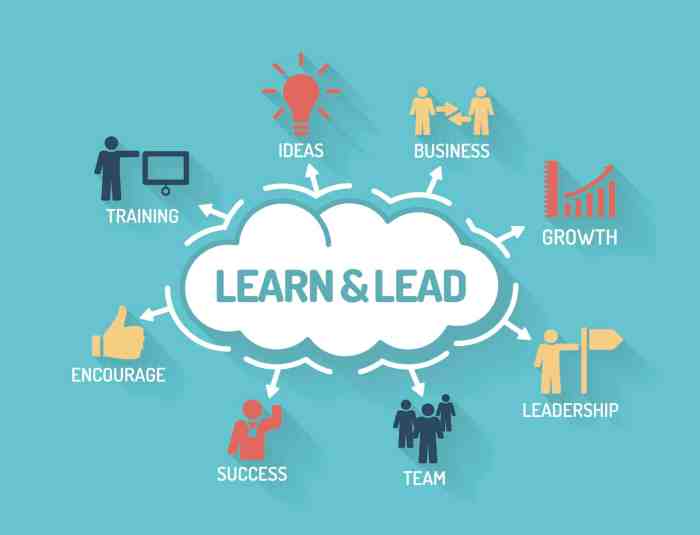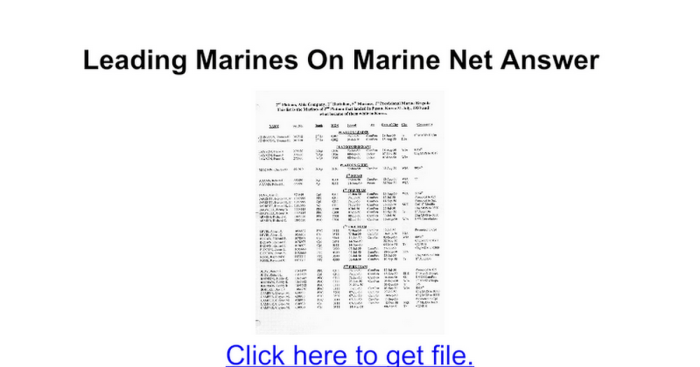Developing leaders answers leading marines – Developing Leaders: Answers for Leading Marines explores the essential principles, key characteristics, and effective development programs that cultivate exceptional leaders within the Marine Corps. This comprehensive guide provides insights into the mentorship, coaching, and real-world examples that shape successful leaders, equipping readers with the knowledge and strategies to foster leadership growth and achieve organizational objectives.
The subsequent paragraphs delve into the specific traits and attributes that distinguish exceptional leaders, analyze the effectiveness of leadership development programs, and highlight the transformative impact of mentorship and coaching.
Core Principles of Developing Leaders

The Marine Corps adheres to fundamental principles that guide the development of effective leaders. These principles include:
- Integrity:Leaders must uphold the highest ethical standards and act with honesty, fairness, and trustworthiness.
- Leadership by Example:Leaders set the example for their subordinates through their actions and behavior.
- Mission Focus:Leaders prioritize mission accomplishment and inspire their teams to achieve objectives.
- Professionalism:Leaders exhibit a professional demeanor, maintain a high level of competence, and adhere to Marine Corps standards.
- Decisiveness:Leaders make timely and sound decisions in challenging situations.
Key Characteristics of Successful Leaders
Exceptional Marine Corps leaders possess distinct traits and attributes that enable them to inspire, motivate, and achieve organizational goals. These characteristics include:
- Vision and Foresight:Leaders have a clear vision for the future and the ability to anticipate and adapt to changing circumstances.
- Communication Skills:Leaders effectively communicate their ideas, inspire their teams, and build strong relationships.
- Emotional Intelligence:Leaders understand and manage their own emotions and those of others, fostering a positive and productive work environment.
- Teamwork and Collaboration:Leaders build cohesive teams and foster collaboration to achieve common goals.
- Resilience and Adaptability:Leaders overcome challenges, adapt to changing conditions, and maintain a positive attitude in the face of adversity.
Development Programs and Initiatives
The Marine Corps implements various programs and initiatives to cultivate leadership skills. These include:
- Marine Corps Officer Candidate School (OCS):OCS provides rigorous training to develop foundational leadership skills for aspiring officers.
- Marine Corps Enlisted Leadership School (ELS):ELS trains enlisted Marines in leadership principles, techniques, and responsibilities.
- Leader Development Program (LDP):LDP is a comprehensive program that identifies and develops high-potential leaders throughout the Marine Corps.
- Marine Corps University (MCU):MCU offers graduate-level education and professional development opportunities for Marines.
- Mentorship and Coaching:Senior leaders provide guidance and support to junior leaders, fostering their growth and development.
Mentorship and Coaching, Developing leaders answers leading marines
Mentorship and coaching play a vital role in developing future leaders. Successful mentoring relationships in the Marine Corps:
- Provide Guidance and Support:Mentors offer guidance, advice, and support to their mentees, helping them navigate challenges and develop their skills.
- Foster Growth and Development:Mentors help mentees identify areas for improvement and develop strategies to enhance their leadership capabilities.
- Build Relationships:Mentoring relationships build strong connections between leaders and their subordinates, creating a positive and supportive work environment.
Leadership in Action
Effective leadership in the Marine Corps is evident in real-world examples:
- Operation Desert Storm:General H. Norman Schwarzkopf’s leadership in Operation Desert Storm exemplifies mission focus, decisiveness, and the ability to inspire troops.
- Operation Iraqi Freedom:Lieutenant Colonel Oliver North’s leadership in Operation Iraqi Freedom demonstrates courage, resilience, and the importance of communication.
- Operation Enduring Freedom:Brigadier General James Mattis’ leadership in Operation Enduring Freedom highlights integrity, professionalism, and the ability to adapt to changing circumstances.
Challenges and Opportunities
Developing leaders in the Marine Corps presents challenges and opportunities:
Challenges
- Rapidly Changing Environment:The Marine Corps must adapt to the evolving nature of warfare and technology, requiring leaders to be agile and innovative.
- Budgetary Constraints:Budgetary constraints can limit resources for leadership development programs.
- Operational Tempo:High operational tempo can strain leaders and make it difficult to allocate time for development.
Opportunities
- Leveraging Technology:Technology can enhance leadership development through virtual training and simulation.
- Collaboration with Other Organizations:Partnering with other organizations can provide access to best practices and resources for leadership development.
- Emphasizing Values:Reinforcing the Marine Corps’ core values can foster a culture of ethical and effective leadership.
Key Questions Answered: Developing Leaders Answers Leading Marines
What are the essential principles of developing leaders in the Marine Corps?
The essential principles include defining clear leadership philosophies, fostering a growth mindset, emphasizing integrity and accountability, and promoting teamwork and collaboration.
How does mentorship contribute to leadership development?
Mentorship provides guidance, support, and role modeling, enabling mentees to learn from experienced leaders, develop their skills, and navigate challenges.
What are the key challenges in developing leaders in the Marine Corps?
Challenges include the need for continuous training and development, balancing operational demands with leadership growth opportunities, and fostering diversity and inclusion in leadership roles.
